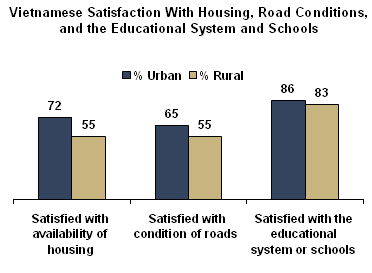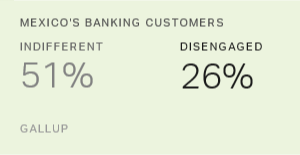GALLUP NEWS SERVICE
PRINCETON, NJ -- The Vietnamese government has set a goal of halving the number of poor households in the country by the year 2010. People who earn 250,000 Vietnamese dong (VND) per month or less (roughly $16 U.S.) are regarded as poor by the National Targeted Programme on Poverty Reduction (NTP-PR); they make up the 22% of households nationwide that subsist in poverty.
To reach this goal, the government needs to collect more than $3 billion U.S. dollars from central and local government coffers, as well as individual domestic and international donors. The funds would be used to support programs that strengthen the livelihood of poor Vietnamese by offering loans, bolstering agricultural activities, making education more affordable, and providing temporary housing to the most needy. In addition to the NTP-PR, Programme 135 aims to achieve specific poverty-reduction milestones among the most destitute Vietnamese; its goals include providing passable roads and schools with acceptable classrooms in every commune.
The Â鶹´«Ã½AV World Poll asked Vietnamese to share their thoughts on a variety of topics that shape their lives. When it comes to the infrastructure that the government seeks to improve through these programs, the results are mixed:
- Just 59% of Vietnamese overall say they are satisfied with the availability of good, affordable housing in the country; satisfaction is significantly higher among city-dwellers (72%) than among rural residents (55%).
- Satisfaction levels are similar when asking about the condition of the roads and highways. Slightly more than half of rural residents (55%) are satisfied with the roads and highways, while nearly two-thirds of urban residents (65%) feel the same.
- Both urban and rural residents show optimism about the country's schools: 84% of Vietnamese country-wide claim to be satisfied with the educational system.

Part two in this series will examine what the anti-poverty program could mean for the well-being, health, and standard of living of the Vietnamese population.
Survey Methods
These results are based on face-to-face interviews with a randomly selected national sample of 1,023 Vietnamese, aged 15 and older, conducted Mar. 1-28, 2006. For results based on this sample, one can say with 95% confidence that the approximate error attributable to sampling and other random effects is ±3 percentage points for a percentage at 50%. In addition to sampling error, question wording and practical difficulties in conducting surveys can introduce error or bias into the findings of public opinion polls.
